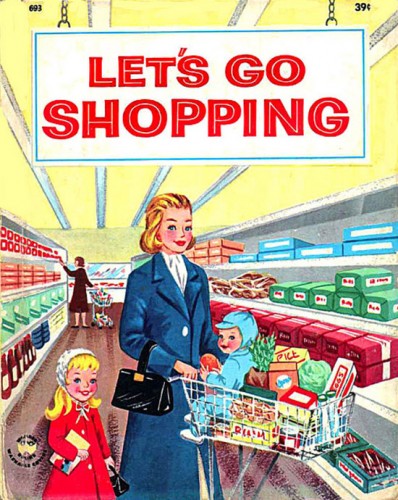Spending our way out of trouble appeals to our leaders, but it’s no way to build a sustainable economy. [31 January 2012 | Peter Boyer]
I’ve just posted off a birthday present to my son. Nothing extravagant. He’s learned over the years to expect modest gifts from me, and this year will be no exception.
I was disappointed to find that I’d run out of second-hand wrapping paper, which I try to put aside after carefully opening my own gifts. So his present this year, while not expensive, is at least expensively wrapped.
I’m a reluctant spender on many things. When neighbours and friends have installed new kitchens, bathrooms and decks, I’ve dragged my heels over upgrading the family home. We’ve had some renovations (which I appreciate), but not on my initiative. I guess I like my home the way it is.
The same with the way I dress. Out and about I like to look presentable (who doesn’t?), but at home, writing this or walking the dog, I wear the same familiar rags day after day. I do have a change of rags, so they’re reasonably clean.
I see myself as frugal, but I suspect that like my sons you may already have decided that I’m stingy. I can understand that. Admitting you’re a careful spender is a bit like admitting you like your beer at room temperature, or that you don’t drink at all. Definitely not a good look.
Nor is it any way to win friends. Wherever you live in the world, it pays to look rich. Money begets money, a notion that politicians, businesspeople and the rest of the world’s moneyed classes tend to live by. Not to mention confidence tricksters — when did you last see a down-at-heel conman?
It’s a notion that finds an echo up and down all the corridors of power, in every political speech and media conference, every meeting place and shopping centre, in the daily news and most of all in the outpourings of the advertising industry.
As ABC-TV’s The Gruen Transfer has shown us, there’s no limit to the ingenuity of the advertising industry in getting us to spend money, by means of television, cinema, online and print media, roadside hoardings and all kinds of public events. They even weave their “spend” message into broadcast commentary and service announcements.
Advertising is a dominant force in our lives. An increasing range of media gets out about 100 times as many “buy” messages as there were in the 1950s. We’re now exposed to more advertisements in a year than people living 50 years ago saw in their lifetimes.
All very glamorous, but there’s a whiffy side of the spending boom — unwanted refuse which in this country, according to the Australia Institute, amounts to around $10 billion a year in wasted wealth. Globally, the impact of our waste on ecosystems has been little short of catastrophic.
Australian politicians and business leaders — themselves avid users of advertising in their own interests — have long been part of the campaign to convince us to spend more. Spending is patriotic, they say, good for both you and your country.
And by the way, say the same leaders, we should also protect our environment.
Do any of them have any idea of the contradiction between these positions? Of course. Do any of them care? I doubt it. Life’s too short and the next election or annual meeting too imminent for it to worry them. The state of the environment is a “soft” issue compared to the state of the money.
There’s a big flaw in their reasoning. The way politicians, bureaucrats, business leaders and economists determine economic success ignores significant cost and wealth indicators.
For example, there’s no requirement for government or business to factor into their financial reporting the contribution of voluntary workers in keeping communities ticking over and maintaining their assets, or the value of ethical and transparent governance (or the cost of corruption and maladministration).
Most tellingly, despite decades of evidence that economies which fail to account for environmental consequences are themselves failed economies, financial reporting processes continue to diminish or ignore such consequences.
The message from our leaders’ unqualified support of consumer spending is that sustainability has nothing to do with success, which is measured only in the present tense. To hell with tomorrow.
My childhood abounded with moral tales, one of them about a cricket that prepared for harder times and a grasshopper that frolicked all summer and came to a sticky end. It stuck with me through all the profligate second half of the last century, a tiny note of caution amid all that noisy excess.
Over the years I’ve found that being frugal has its own rewards. Slowing down the opening of the birthday present to save the wrapping also serves to extend the delicious anticipation of the surprise that awaits.
I’ve also learned that while the cricket has its good points, so does the grasshopper. We’re social animals, and life without a party isn’t worth a lot. For our communities to function we have to make an effort with other people, to treat them well and care about them. Being frugal isn’t the same as being ungenerous.
Which brings me to another confession. My son, the one getting the birthday present, now lives in Beijing with his partner and two of my three young grandchildren.
For me, staying put means having no contact with the youngsters during their formative years, while keeping in touch means a long, carbon-intensive air journey. Just once, I’m going with the latter. There are no simple choices.

